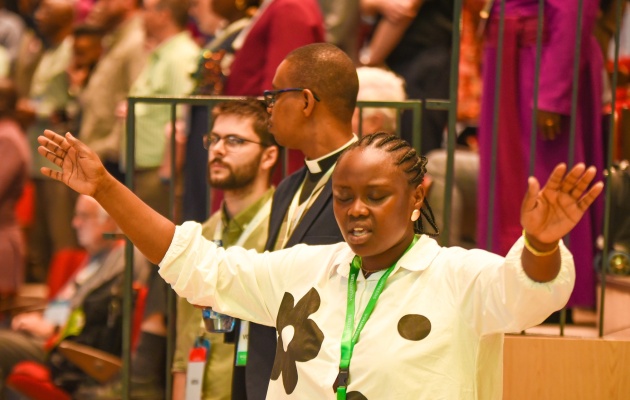A majority of the Anglican Communion was represented in Kigali, with a shared high value of Scripture, passion for evangelism and discipleship, and concern for orthodox fellowship. By Chris Green.
![A plenary sessiong of Gafcon IV, in Kigali (Rwanda), 17-21 April 2023. / Photo: Facebook [link]Gafcon[/link].](https://cms.evangelicalfocus.com/upload/imagenes/6448f6899bdef_341912460_1481183639082345_6588158206140250493_nCropped.jpg) A plenary sessiong of Gafcon IV, in Kigali (Rwanda), 17-21 April 2023. / Photo: Facebook [link]Gafcon[/link].
A plenary sessiong of Gafcon IV, in Kigali (Rwanda), 17-21 April 2023. / Photo: Facebook [link]Gafcon[/link].
In Kigali, Rwanda, I was sitting with around 1,300 fellow Christians from 50 plus countries. More importantly, there were many hundreds of bishops and archbishops present in that number. It was a meeting of global orthodox senior leadership for Anglicans like me, praying and planning together. And I know nothing like it.
I was not just there as a punter (no-one present was, really). I agreed to become a trustee of this movement a number of years ago, so for me this is not just a conference - this is home.
Back in 2003 an American was made a bishop, who was in an active same-sex relationship. A number of international conferences and statements had identified this as wrong, pleaded with the Episcopal church not to do it, identified the issue as one of sin and disobedience to clear Scripture, and warned of consequences - but the US church went ahead anyway. That practice has continued in the US, Canada, and elsewhere, with increasing normalisation, and the rift has widened and worsened.
That act, among others, led to a significant number of bishops and archbishops refusing to attend the once-in-a-decade Lambeth Conference in England, to be hosted by the Archbishop of Canterbury in 2008, if the US (with the others) was also present, unrebuked and undisciplined.
The first GAFCON (Global Anglican Futures Conference) was therefore held as a spiritual home for those unable to attend Lambeth. It was held in Jerusalem, also in 2008. It has since met three more times: in Nairobi (2013), again in Jerusalem (2018), and today in Rwanda.
Estimates vary, but it seems that a majority of the Anglican Communion was represented in Kigali (and it might be 85%, according to some), with a shared high value of Scripture, passion for evangelism and discipleship, and concern for orthodox fellowship.

[photo_footer] A time of worship at Gafcon IV, in Kigali. / Photo: Facebook Gafcon. [/photo_footer]
Daily bible readings from Colossians, worship, testimonies, smaller meetings, strategy sessions and planning for a proper conference statement made for a busy, multilingual day. Then the singing got spontaneous, the timetable went out the window, and it was wonderful.
And I loves being involved in something where people who look and sound like me are not in charge.
I’m English, and so issues in the Church of England at the front of my mind, but it is humbling to realise how they affect the rest of the world. The ongoing debate about whether to bless same-sex unions in church, and the CoE General Synod decision to develop prayers for individuals who might be in such relationships, is watched with a great sense of shock, and of betrayal of the biblical gospel.
In part that’s for reasons of history and affection, because the Church of England had planted gospel work around the world. But much more seriously, many parts of the Anglican family are constituted, legally, by their relationship to the Church of England, or to the Archbishop of Canterbury - provided that those don’t change doctrine. So, if the Church of England departs from biblical orthodoxy it has global ramifications which don’t apply if it were any other province.
Hence the wonderful, providential timing of this conference, years in the planning, but shortly after a momentous General Synod debate and proposals.
Most provinces are now actively considering their relationship to the Archbishop of Canterbury, to the Anglican Communion, and wondering whether something new might emerge.
Chris Green, Vicar of St James, Muswell Hill (London). This is an abridged version of a blog posted on the website of IVP Books. Re-published with permission.

Las opiniones vertidas por nuestros colaboradores se realizan a nivel personal, pudiendo coincidir o no con la postura de la dirección de Protestante Digital.
Si quieres comentar o